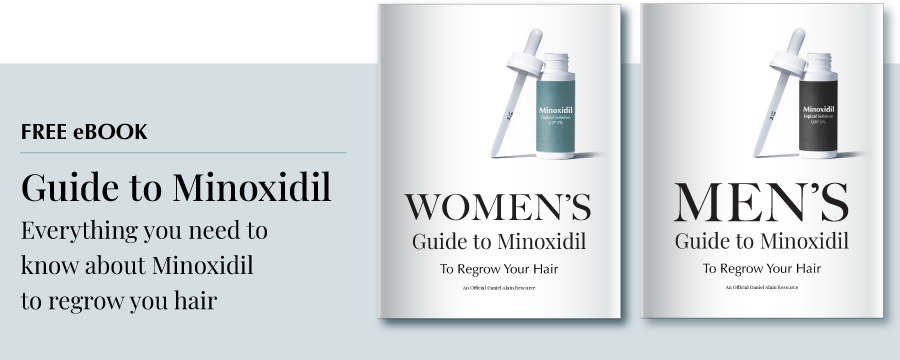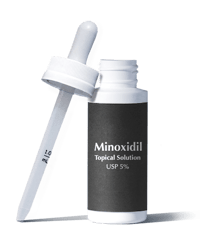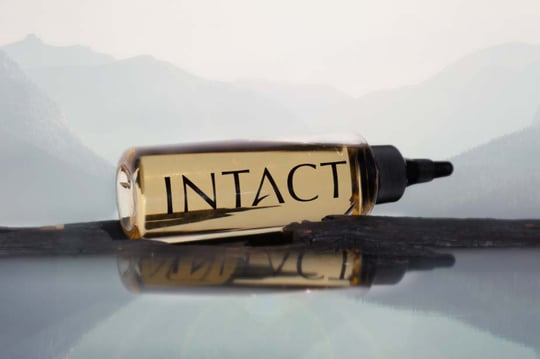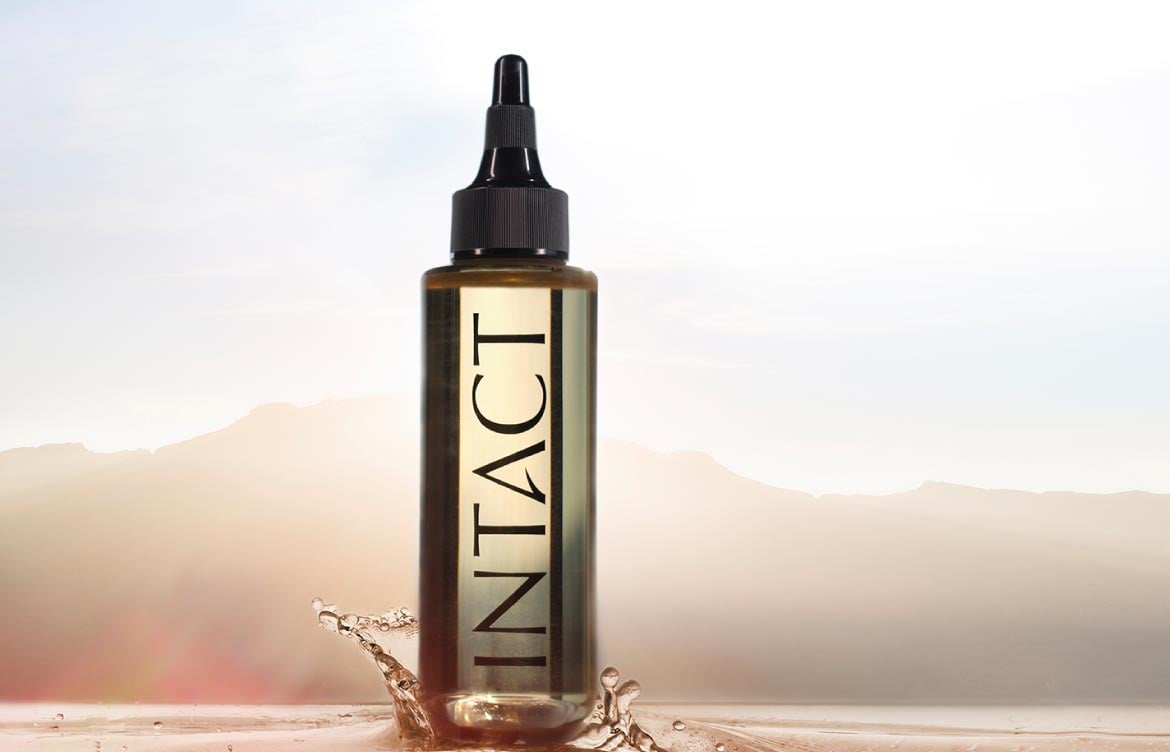Best Treatment for Hair Loss

Running your fingers through your hair shouldn't be a cause for concern. But for many women, it's a daily reminder of a more distressing reality: hair loss.
Hair loss affects roughly 60% of women and around 85% of men by age 50. If you're experiencing hair thinning or hair loss, you know how frustrating it can be to watch your once-lush locks fall out by the handful day after day—making the need to find the best hair loss treatment all the more pressing.
Unfortunately, there's no surefire way to prevent hair loss. However, some regimens and procedures can help stop hair loss from progressing and may even promote new hair growth. Figuring out which one is the most effective hair loss treatment for you may require some trial and error.
Read on to uncover the best hair loss treatments modern science has to offer.

WHAT'S THE BEST HAIR LOSS TREATMENT?
Pinpointing the best treatments for hair loss isn't always easy. That's because hair loss can be caused by a variety of factors, including:
- Hormonal imbalances
- Nutritional deficiencies
- Autoimmune conditions
- Medications and medical treatments
- Stress
- Genetics
As a result, the best hair loss treatment for you may depend on the underlying cause of your condition. With so many options, you’re probably wondering which treatment is the best for hair loss?
Understanding how the most popular avenues work can help you make an informed decision about which one is best for you. So let’s dive in.
Minoxidil

One of the most common and most effective hair loss treatments is Minoxidil (brand name Rogaine®). Minoxidil is an FDA-approved topical solution applied directly to the scalp and available over the counter in different strengths, ranging from 2% to 5%.
The higher the concentration of Minoxidil, the more likely it is to cause side effects such as dryness, itchiness, and redness. As a result, most people start with a lower concentration and move up if necessary.
How Does it Work?
Minoxidil works by gently opening up your scalp's blood vessels so they can receive the necessary oxygen and nutrients that encourage hair growth. This prolongs the hair's growth phase (known as the Anagen Phase), allowing your hair to grow longer and thicker.
For some, results can be seen as early as 2-3 months but typically take around 6-9 months to fully kick in.
How Effective is It?
While Minoxidil is believed by many to be the best treatment to stop hair loss, it is designed to only help those who are experiencing genetic hair loss. On top of that, our latest research has uncovered that people with the SULT1A1 enzyme respond best to Minoxidil.
You no longer have to gamble on whether Minoxidil will work for you. We can test your DNA to see if you have the SULT1A1 enzyme activity and, as a result, if Minoxidil is likely to work for you. Click here to check out our revolutionary Minoxidil Response Test.
How Much Does It Cost?
The cost of Minoxidil will depend on the concentration you choose and the size of the bottle. Prices can range from $30 to $45 for a 60ml bottle.
Finasteride
Finasteride (brand name Propecia) is an FDA-approved prescription medication taken orally designed to treat genetic hair loss in men, also known as male pattern baldness. Women can be prescribed it on a case-by-case basis as it's not safe to take during pregnancy.
How Does it work?
Finasteride (brand name Propecia) is an FDA-approved prescription medication taken orally designed to treat genetic hair loss in men, also known as male pattern baldness. Women can be prescribed it on a case-by-case basis as it's not safe to take during pregnancy.
How Effective is It?
When used as directed, Finasteride is one of the best hair loss treatments available for men. However, it showed the most significant results of regrowth on the crown of the head versus other areas on the scalp.
Women have had results from Finasteride, but only if they're post-menopausal or do not want to conceive.
How Much Does it Cost?
Finasteride is relatively affordable, costing roughly between $12 and $50 for a three-month supply.
INTACT Anti-Hair Shedding

How Does it Work?
Our patented PiliLock® Sevilla Orange Complex locks in every delicate strand at the root by stimulating the arrector pili, tiny little muscles that live inside every follicle. By causing these muscles to tighten, the scalp is better able to protect each strand from damage during daily high-risk shedding activities like washing, brushing, and styling.
Allow the formula to work its magic for 30 minutes before you shower and then shampoo and condition as usual. The result is a reduction in hair shedding as your scalp becomes healthier and stronger with each treatment.
How Effective is It?
Intact is clinically proven to reduce shedding by up to 77%. The more you use it, the better it works to keep your hair where it belongs—on your head.
How Much Does it Cost?
A 2 fluid-ounce bottle of INTACT costs $27. You can grab yours here.
Hair Transplant
A hair transplant is a surgical procedure that involves taking hair from an area of the scalp with dense growth and transplanting it to an area that is balding or thinning. While it used to be an option that was exclusively for men, it is now being used to treat female pattern baldness with promising results.
However, not all women are candidates for this procedure. The best way to determine if you’re a good candidate is to consult with a hair restoration specialist.
How Does it Work?
Generally, there are two types of hair transplantation: FUT and FUE.
FUT, or Follicular Unit Transplantation, involves removing small strips of hair from the back or side of your head—known as the donor site—and transplanting them to the balding or thinning areas. Approximately 90% of surgeons use this method.
FUE, or Follicular Unit Extraction, is a newer technique that involves removing individual follicles from the donor site and transplanting them to the balding or thinning areas. This method results in small scars.
How Effective is It?
Hair transplants are considered to be a permanent solution to hair loss. As little as 10% to as much as 80% of the transferred hair will fully grow within 3-4 months of the procedure.
However, just like your natural hair, the transplanted hair will continue to thin as you age.
How Much Does it Cost?
The cost of a hair transplant will vary depending on the surgeon, the clinic, and the country in which you have the procedure done. In the United States, the average cost is between $4,000 and $15,000.
Platelet-rich Plasma
Platelet-rich plasma therapy (PRP) is one of the best hair loss treatments as it uses your own blood plasma to stimulate hair growth.
How Does it Work?
PRP Therapy for hair loss involves taking a small sample of your blood platelets and injecting it into any areas of hair loss. Inside your platelets are bioactive growth proteins that can promote hair growth.
The process is minimally invasive and will start showing results within 3-6 months. Multiple sessions may be required to achieve desired results.
How Effective is It?
PRP therapy is a relatively new treatment for hair loss, so there is not a lot of data on its effectiveness. However, research seems to point to it being a viable solution for those suffering from Androgenetic Alopecia.
How Much Does it Cost?
PRP Therapy can cost anywhere from $500 for a single session to $2,500 for a package of sessions.
Low-Level Laser Therapy
Low-level laser therapy (LLLT) is a non-invasive and painless treatment that stimulates cell growth in your scalp and improves hair loss. It's also referred to as cold laser therapy and red light therapy.
How Does it Work?
During an LLLT treatment, a device is placed on your scalp and low-level lasers are directed at your hair follicles. These lasers expose photons in your scalp to radiation. These photons are then absorbed by your weakest cells to promote circulation and cell growth.
How Effective is It?
Inconsistent results make it difficult to determine the effectiveness of LLLT. One study found it to be a safe and effective treatment for women suffering from hair loss.
How Much Does it Cost?
Clinical laser treatments can cost anywhere from $1,500 to $3,000 for just the initial three sessions. The price depends on the severity of hair loss and the number of sessions required.
FIND the best hair loss treatment for you AT DANIEL ALAIN
Going down the rabbit hole of the best treatments for hair loss can leave you with a lot of unanswered questions. At Daniel Alain, we understand how overwhelming this process can be, which is why we aim to offer a variety of solutions to help you no matter what stage of hair loss you're in.
From our INTACT Anti-Shedding Solution to our line of luxury human hair wigs, we're here to help find the best hair loss treatment for you. Schedule a consultation with our in-house experts today to get started!
book a free consultation
Our stylists will help you find the right hair loss treatment for you

Frequently Asked Questions
What is the Most Effective Hair Loss Treatment?
There is no one-size-fits-all answer to this question, as the best hair loss treatment will vary depending on the individual. However, some of the most effective hair loss treatments include Minoxidil, Finasteride, INTACT, hair transplants, and platelet-rich plasma therapy.
What is the Newest Hair Loss Treatment?
Platelet-rich plasma therapy and low-level laser therapy are two of the newest treatments for hair loss. While the results are promising, more research for both treatments is needed to determine their long-term effectiveness.
What Causes Hair Loss?
Unfortunately, there is no simple answer to this question as hair loss can be caused by a variety of factors, including:
- Genetics: your mom and dad can pass on the genes that make you more susceptible to hair loss
- Stress: both mental and physical stress can lead to hair loss
- Hormonal changes: during menopause, pregnancy, and thyroid problems, you may experience hair loss
- Autoimmune diseases: conditions like lupus and psoriasis can cause your body to attack your hair follicles
- Certain medications: certain medications used to treat cancer, high blood pressure, and depression can lead to hair loss
- Diet: a diet lacking in protein and essential nutrients can lead to hair loss
- Environment: exposure to chemicals and pollutants can damage your hair follicles
- Traction and pulling: hairstyles that pull on your hair, like tight ponytails and cornrows, can cause hair loss
Do Men & Women Lose Hair the Same Way?
Though the cause of hair loss may be the same for both men and women, the way it manifests itself is often different. Male pattern baldness typically causes a receding hairline and thinning crown, while women tend to experience diffuse thinning all over the scalp.
Do Hair Loss Treatments Work the Same for Men & Women?
Not all hair loss treatments are effective for both men and women. For example, Finasteride is only approved by the FDA for use in men, and minoxidil can be used by both sexes but is more effective in men.
That being said, there are some hair loss treatments that are effective for both men and women, like platelet-rich plasma therapy and low-level laser therapy.
Can You Prevent Hair Loss?
There is no guaranteed way to prevent hair loss, but there are some things you can do to reduce your risk. For example, managing stress, eating a healthy diet, and avoiding hairstyles that pull on your hair can all help.
In some cases, genetic hair loss cannot be prevented. However, if you're experiencing hair loss due to medication or a medical condition, talk to your doctor about the best treatment to prevent hair loss for you.
How Do I Know if I am Genetically Predispositioned to Lose My Hair?
The easiest way to determine if you're genetically predisposed to hair loss is to take a look at your family history. If you have any relatives who have experienced hair loss, there's a good chance you may be at risk as well.
Another way to tell if you're genetically predisposed to hair loss is to pay attention to any early signs, like a receding hairline or thinning crown.
Is it Possible to Regrow Your Hair After You Lose it?
As long as the hair follicle is still intact, then yes, it is possible to regrow your hair. However, if the follicle is gone, scarred, or closed up, then hair growth is not possible.
Is There a Way to Instantly Stop Hair Loss?
The fastest way to stop hair loss is to keep the hair you have on your head. Avoid over-brushing, washing too often, and using harsh chemicals or heat treatments on your hair. Using an anti-shedding treatment like INTACT can help to fortify and strengthen your hair, making it less likely to break or fall out.
How Can I Thicken My Hair?
Increasing the density of your hair can reduce the appearance of thinning and make your hair look thicker. Unfortunately, genetics play a huge role in hair density, so if you have thin hair to begin with, you may not be able to do much about it.
Taking care of your hair, using the right products, and avoiding hairstyles that pull on your hair can help to give the appearance of thicker hair. Here are a few tips:
- Eat a diet rich in healthy fats as they aid in hair growth and reduce scalp inflammation
- Reduce heat styling to avoid getting dry and brittle strands
- Use a sulfate-free shampoo
- Brush upwards from your ends to your roots to reduce unnecessary breakage
- Try some volumizing products
- Give yourself a weekly scalp massage
Is Hair Loss & Hair Thinning the Same Thing?
No—hair thinning is when your individual strands start to become thinner, while hair loss is when you actually lose hair from your head. Hair loss will be much more noticeable as it often manifests as bald patches or a growing part on your crown.
Is There a Pill for Hair Loss?
Finasteride is a pill that is FDA-approved for male pattern baldness. It works by reducing the amount of DHT in the scalp, which is a hormone that contributes to hair loss.
While it can be effective for women, it's not recommended to those who are pregnant or may want to become pregnant as it causes birth defects.
Is Biotin Good for Hair Loss?
Despite the popular claims that it supports healthy hair growth and can thicken brittle strands, there is a limited amount of evidence to suggest that Biotin supplements are effective for hair loss.
Biotin is most effective only in those who have a rare biotin deficiency.
Is There a Natural Remedy for Hair Loss?
There are several natural remedies that claim to stop hair loss and promote hair growth. However, there is little scientific evidence to support these claims.
Some of the most popular natural remedies for hair loss include:
- Essential oils like lavender, rosemary, and thyme
- Scalp massages
- Aloe vera
- Coconut oil
How Can I Strengthen My Hair?
There are several things you can do to help fortify and strengthen your hair:
- Get regular trims to get rid of damaged, split ends
- Avoid over-brushing, which can damage the hair shaft
- Wash your hair less often to avoid stripping it of its natural oils
- Use a deep conditioner at least once a week
- Be gentle with your hair when styling it
- Use a heat protectant before using any heat styling tools
It's normal to lose 50-100 hairs a day, but if you're losing more than that, it could be a sign of an underlying issue. Consult with a hair loss expert to get to the root of the problem and find the best hair loss treatment for you.




